 Petzlover
Petzlover Affenpinscher is originated from Germany but Australian Red Heeler is originated from Australia. Affenpinscher may grow 21 cm / 8 inches shorter than Australian Red Heeler. Affenpinscher may weigh 10 kg / 22 pounds lesser than Australian Red Heeler. Both Affenpinscher and Australian Red Heeler has almost same life span. Affenpinscher may have less litter size than Australian Red Heeler. Affenpinscher requires High Maintenance. But Australian Red Heeler requires Moderate Maintenance
Affenpinscher is originated from Germany but Australian Red Heeler is originated from Australia. Affenpinscher may grow 21 cm / 8 inches shorter than Australian Red Heeler. Affenpinscher may weigh 10 kg / 22 pounds lesser than Australian Red Heeler. Both Affenpinscher and Australian Red Heeler has almost same life span. Affenpinscher may have less litter size than Australian Red Heeler. Affenpinscher requires High Maintenance. But Australian Red Heeler requires Moderate Maintenance
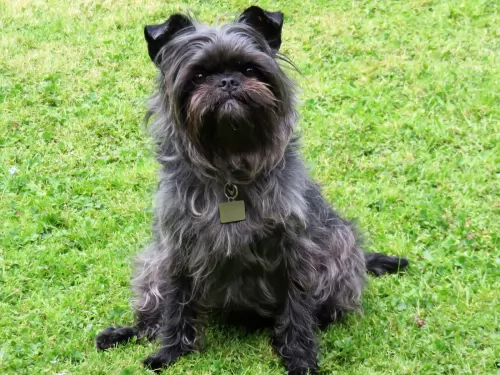 This breed originated from Germany. The latest information on this breed is from the 17th century. Actually, Affenpinscher got its name from Affe, which means monkey. Their accentors considered to be Brussels Griffon and Mini Schnauzer. People trained this breed to be a working dog, to remove rodents, granaries, and stables from the living area.
This breed originated from Germany. The latest information on this breed is from the 17th century. Actually, Affenpinscher got its name from Affe, which means monkey. Their accentors considered to be Brussels Griffon and Mini Schnauzer. People trained this breed to be a working dog, to remove rodents, granaries, and stables from the living area.
 When George Hall arrived in the New South Wales Colony in 1802 he set about ‘creating’ a tough working- or herding dog. By crossing Australia’s native Dingoes with Collies as well as with other herding dogs, the robust Red Heeler, also known as the Australian Cattle Dog came into being. Today he is a thick-set dog, ideally suited to working livestock.
When George Hall arrived in the New South Wales Colony in 1802 he set about ‘creating’ a tough working- or herding dog. By crossing Australia’s native Dingoes with Collies as well as with other herding dogs, the robust Red Heeler, also known as the Australian Cattle Dog came into being. Today he is a thick-set dog, ideally suited to working livestock.
Ranchers, particularly, were impressed with the breed’s toughness and they were sought after on cattle stations. The name actually comes from them when the dogs are herding animals, they nip at their heels to get them moving.
The Blue Heeler and the Red Heeler breed are the exact same dog, but just different colors. These Australian cattle dogs originated in Australia in the mid-1800s and adapted well to the harsh desert environment of the outback.
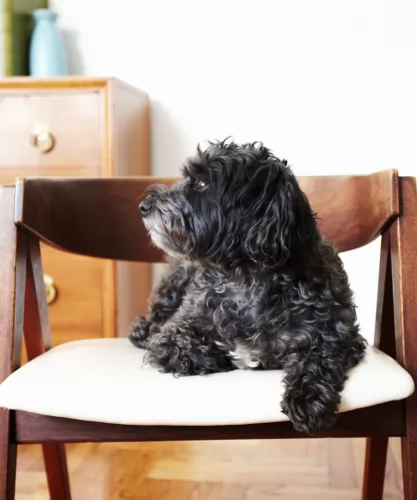 Affenpinscher is a toy size breed and it weights between 2.6 kg to 6 kg. There is no big difference between male and a female dog.
Affenpinscher is a toy size breed and it weights between 2.6 kg to 6 kg. There is no big difference between male and a female dog.
The height of the breed is approximately 23 to 30cm. They have monkey-like expressions, and that is why it got its name. The primary color of the coat is black, but it can be gray, brown, red, white). Every club has a list of acceptable colors. Not all the colors are accepted in every country.
The lifespan of Affenpinscher variates from dog to dog, but it is on average 11.4. That is a typical lifespan of dog that size, but they can live much more depends on the care and health of the dog.
Litter size of Affenpinscher is 1-3 puppies. They are very small dogs, so having a small number of puppies is normal for mini breeds.
Other Names of Affenpinscher are monkey dog, Affen or Affie. All the other names are related to its size and monkey-like look.
 The Red Heeler or Australian Cattle Dog is a sturdy, muscular dog with ears that are pricked and with dark, alert eyes. The tail is long. The neck, shoulders and legs of the Red Heeler are strong and muscular. The dog is longer than tall – the length of the body is greater than the height at the withers. A well fed, well exercised, well cared for Red Heeler will weight roughly 15–22 kilograms.
The Red Heeler or Australian Cattle Dog is a sturdy, muscular dog with ears that are pricked and with dark, alert eyes. The tail is long. The neck, shoulders and legs of the Red Heeler are strong and muscular. The dog is longer than tall – the length of the body is greater than the height at the withers. A well fed, well exercised, well cared for Red Heeler will weight roughly 15–22 kilograms.
There are 2 coat colours of the Reeler – red and blue, but there are are lesser varieties such as chocolate, cream, blue mottled, brindle and some with white markings. It is interesting to note that with both the Red- and the Blue Heeler, puppies are generally born white, with the coat turning to red as they mature.
These Australian Cattle Dogs display patches of solid colour, and you might well find masks over one or both eyes and a white tip to the tail. Both the Red and Blue Heeler can have a white star on the forehead which is referred to as the Bentley Mark. The Heelers have a double coat - short, straight outer hairs while the undercoat is short, fine and dense. Despite their short coat, they shed a lot.
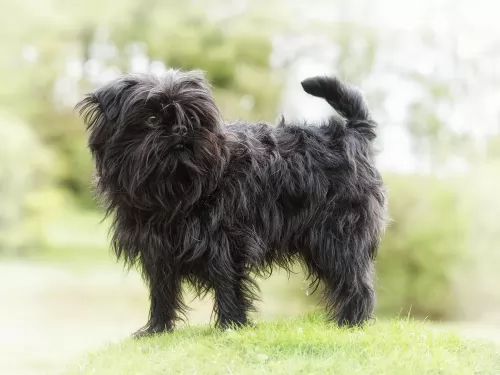 Affenpinscher is a toy sized dog, so they are fragile and you always have to watch out for them. They require a lot of training because they are very stubborn. Breed experts recommend positive training because they can’t respond badly and get depressed if you practice old ways of practice, which include punishments.
Affenpinscher is a toy sized dog, so they are fragile and you always have to watch out for them. They require a lot of training because they are very stubborn. Breed experts recommend positive training because they can’t respond badly and get depressed if you practice old ways of practice, which include punishments.
They tend to bark a lot and can be unfriendly to guests and other animals. It is important to train them properly and to spend as much time as they can with other animals.
The great thing about Affenpinscher is that they are very easy to carry around and they are beautiful little dogs. They are braver than most of the toy dogs because of the terrier descent. The funny thing about them is that they take themselves very seriously which can be very funny to the owners.
They don’t need a lot of exercises. They love walking, but they do not require a lot of it.
Affenpinscher is a great watch dog. They tend to protect the house and they are amazing dogs for watching.
They are not very good with children because they are very sensitive and they love attention. It is also important not to spoil them, even if it’s funny sometimes, it is not recommended to spoil your dog.
 Your Australian Red Heeler needs plenty of exercise but also plenty of companionship too from his human family. He is an affectionate, playful pet but is reserved with people he doesn’t know. When socialized he is patient with children in the home but he does still have the tendency to herd them and nip at their heels. The dog builds up a strong bond with his human family, and is protective toward them, being happy to be close to his owner’s side.
Your Australian Red Heeler needs plenty of exercise but also plenty of companionship too from his human family. He is an affectionate, playful pet but is reserved with people he doesn’t know. When socialized he is patient with children in the home but he does still have the tendency to herd them and nip at their heels. The dog builds up a strong bond with his human family, and is protective toward them, being happy to be close to his owner’s side.
Red Heelers need activities and lots of room to play, and they therefore won’t adapt to apartment living. If you don’t live on a farm, don’t neglect your working dog as he will need lots of rough and tumble games and activities to keep him from boredom. Treat your Australian Red Heeler with the love, patience and kindness and you’ll bring out the very best from this active, loyal fur-friend of yours.
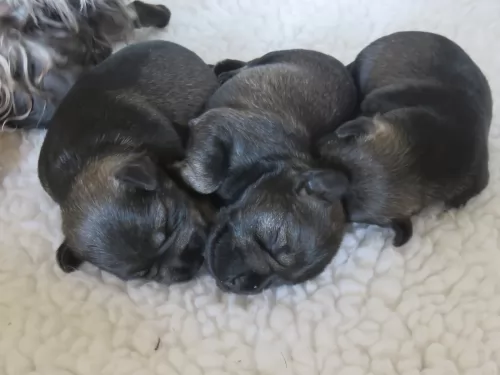 It is very important to choose a quality puppy from a quality breed. Affenpinscher can have some health problems. Hip dysplasia collapsed trachea, and the luxating patella is the most common health complications of this breed. But, the most of the dogs die of an old age, so if you are choosing wisely, and with proper education and consulting, you will have a happy and a healthy dog.
It is very important to choose a quality puppy from a quality breed. Affenpinscher can have some health problems. Hip dysplasia collapsed trachea, and the luxating patella is the most common health complications of this breed. But, the most of the dogs die of an old age, so if you are choosing wisely, and with proper education and consulting, you will have a happy and a healthy dog.
 The Australian Cattle Dog is quite often affected by progressive retinal atrophy, an eye condition where the rods and cones in the retina of the eye deteriorate later in life, and it could lead to blindness. This eye illness is an autosomal recessive trait, and even if the dog doesn’t develop the condition himself, he can be a carrier of the affected gene.
The Australian Cattle Dog is quite often affected by progressive retinal atrophy, an eye condition where the rods and cones in the retina of the eye deteriorate later in life, and it could lead to blindness. This eye illness is an autosomal recessive trait, and even if the dog doesn’t develop the condition himself, he can be a carrier of the affected gene.
The Heeler is just bursting with personality and energy and a study of dogs diagnosed at veterinary colleges described fractures and ligament tears as one of the most common conditions treated with the Australian Red Heeler.
You love your Australian Red Heeler and you want to take good care of him. Check with your vet because at 8 weeks he should be starting with his first puppy vaccinations.
To keep your best friend healthy and happy, watch his diet, ensure he gets plenty of exercise, brush his teeth regularly to remove plaque build-up, and always call your veterinarian when you see he is ill and isn’t his usual boisterous self.
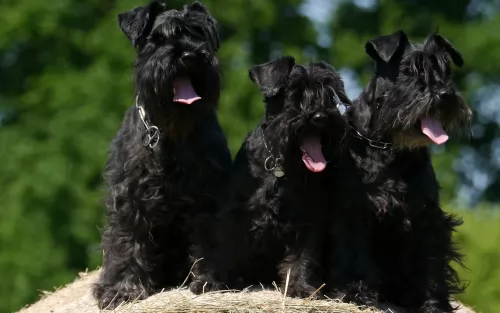 Affenpinscher daily amount food should be based on a size and activity of the dog. But approximately ¼ or ½ cup of high-quality food should be enough for your dog. It is recommended to divide into two meals per day. You can also add some vegetables, oil, meat or fruits into a meal, but only small size portions.
Affenpinscher daily amount food should be based on a size and activity of the dog. But approximately ¼ or ½ cup of high-quality food should be enough for your dog. It is recommended to divide into two meals per day. You can also add some vegetables, oil, meat or fruits into a meal, but only small size portions.
Feeding Affenpinscher puppy is similar to feeding an adult dog. The difference is in a number of meals per day. It is recommended to give 3-5 portions per day for a puppy.
Also giving vitamins and minerals to a puppy dog is very important for health.
Grooming the Affenpinscher could be a challenging task. It requires regular care with every day brushing and cleaning. They have a strong and rough coat. A good side of that is Affen size. They are not big, so there wouldn’t be a lot to groom.
 The Australian Red Heeler is a low maintenance dog. He does shed quite a bit so you’ll need to brush his coat at least twice a week to remove loose hairs and to keep his coat lustrous. When your dog has been in a particularly dusty area, you you wipe his coat down with a damp cloth. As with all dogs, you’ll want to check his teeth, ears, eyes and nails regularly to avoid health problems.
The Australian Red Heeler is a low maintenance dog. He does shed quite a bit so you’ll need to brush his coat at least twice a week to remove loose hairs and to keep his coat lustrous. When your dog has been in a particularly dusty area, you you wipe his coat down with a damp cloth. As with all dogs, you’ll want to check his teeth, ears, eyes and nails regularly to avoid health problems.
If you care for your working- and herding dog you’ll train him to that he becomes a good family dog and companion. The Red Heeler has plenty of energy and stamina and if he grows up untrained and un-socialized, you could see him becoming aggressive towards other animals and even your own children. He certainly becomes over-protective of his territory if not socialized. Train him as he is an intelligent breed and responds well to training.
Any vet will tell you of the critical importance of a proper diet and exercise routine for your dog. He’s an active, smart dog with loads of energy and you want to keep his diet consistent with this energy. Speak to your vet about what food would suit your pet best, because a high quality diet appropriate to his age, his body size and his energy levels will be important. Along with high quality foods which include a good intake of raw meat, your dog must always have access to a bowl of fresh, cool water.